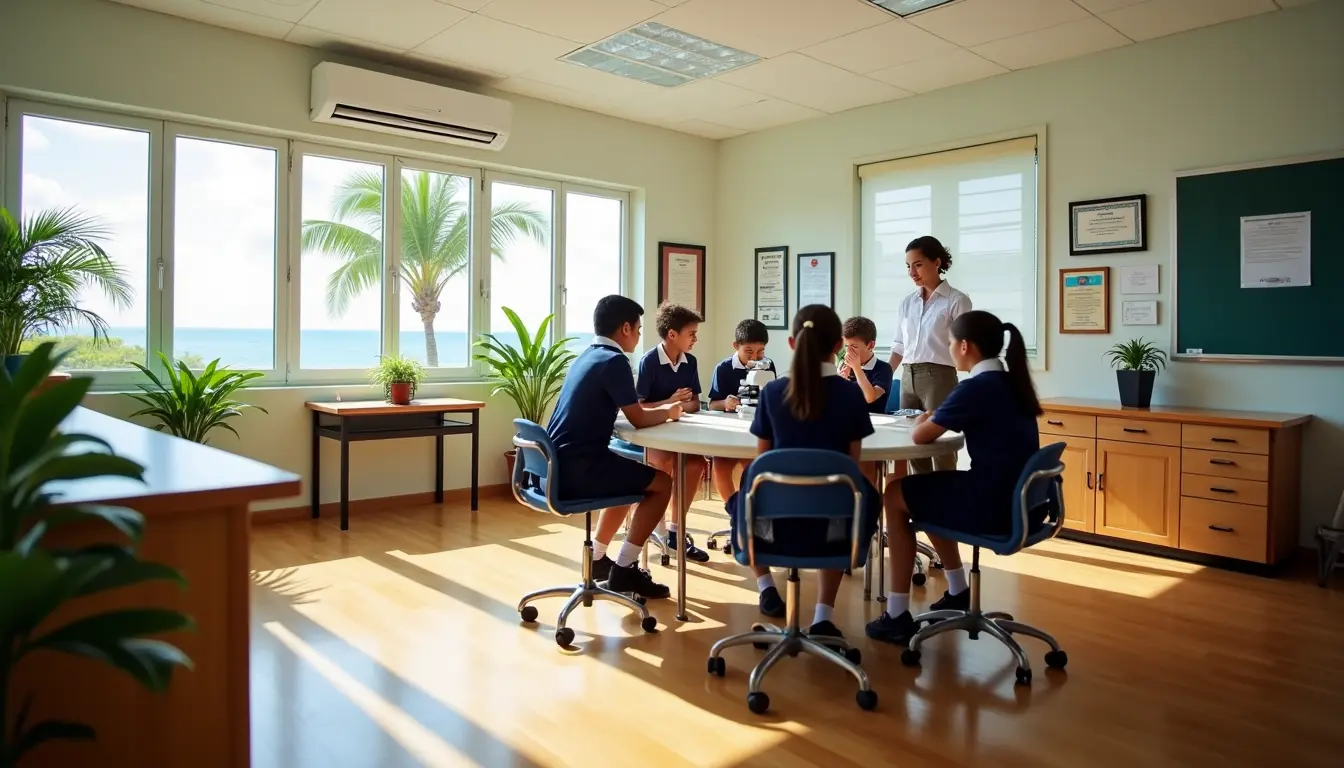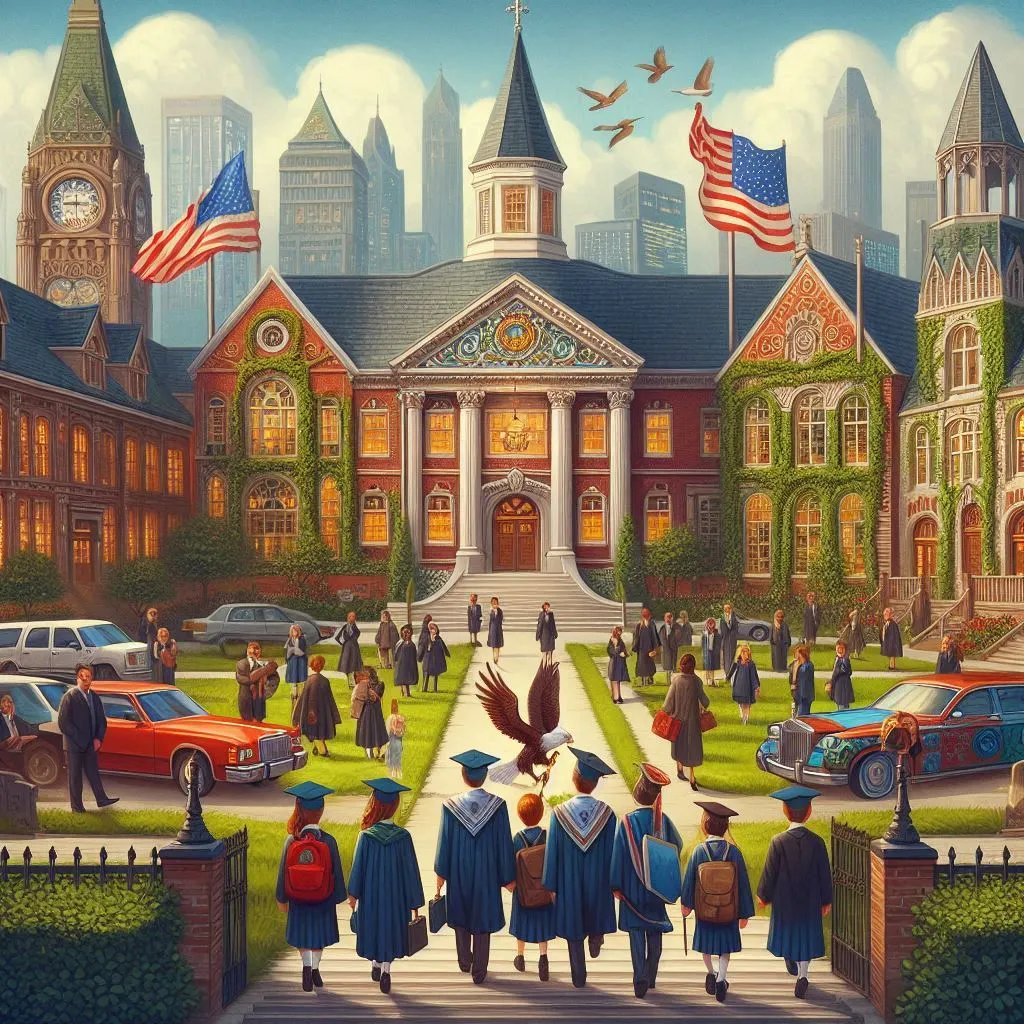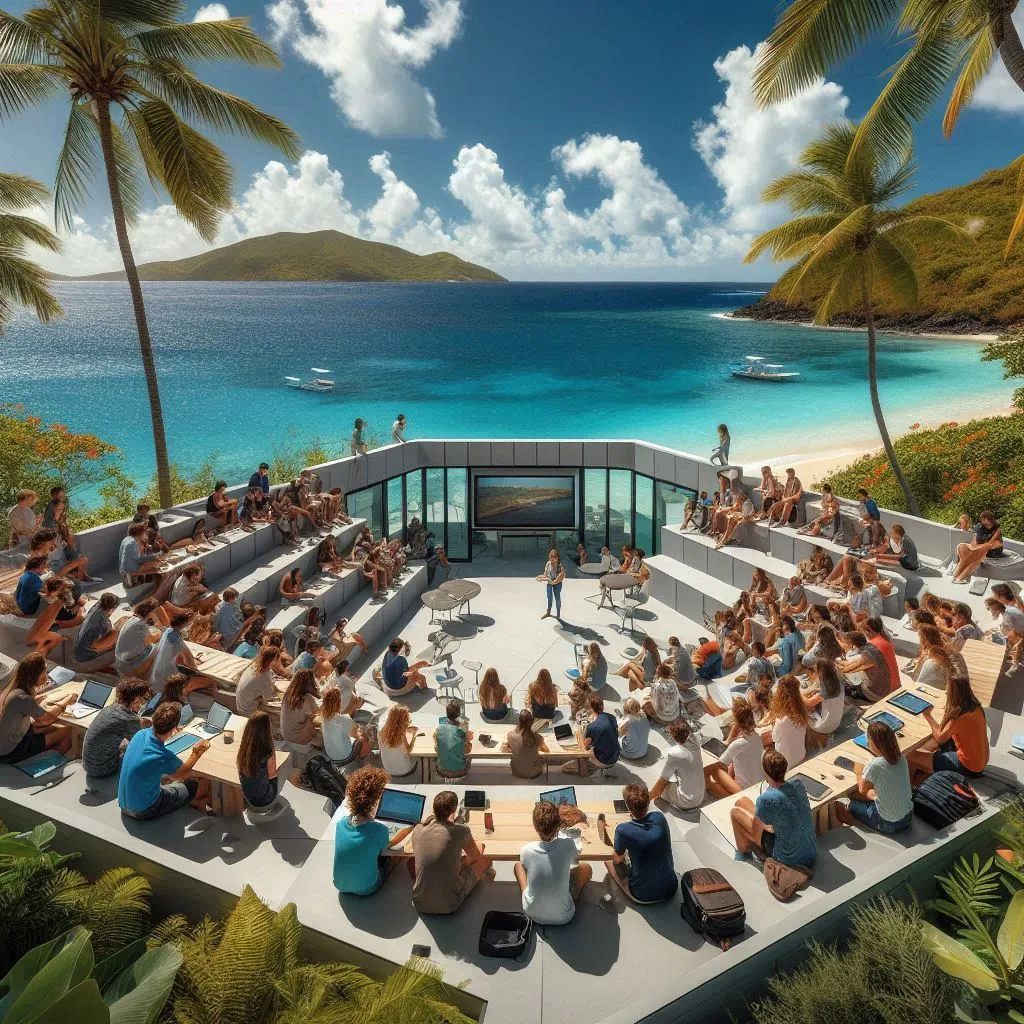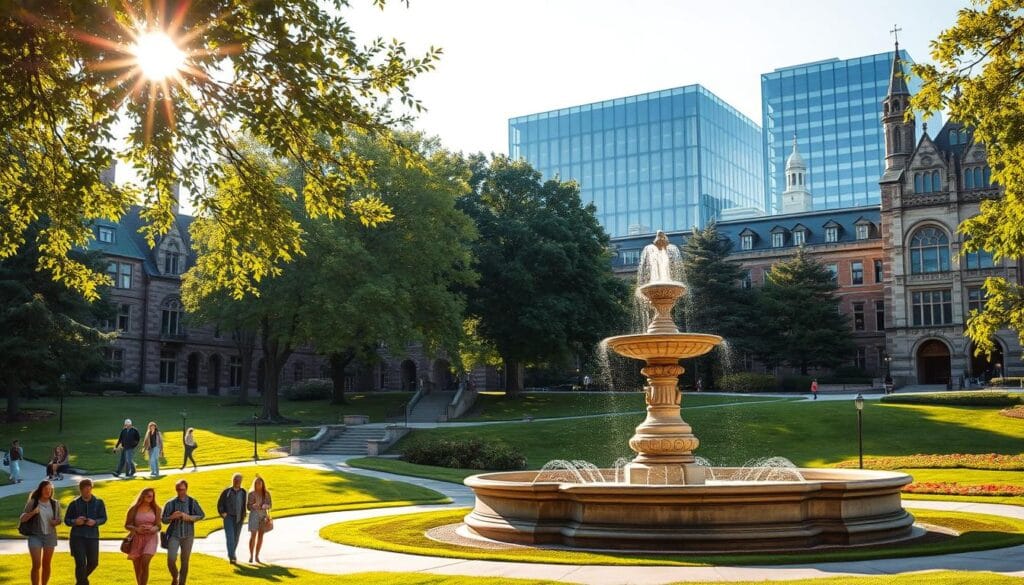Parents in the US Virgin Islands have more educational choices than they might think. The options range from Good Hope Country Day School in St. Croix to the Antilles School in St. Thomas, which has been shaping young minds since 1950. These private schools blend close-knit learning spaces with rich academic programs.
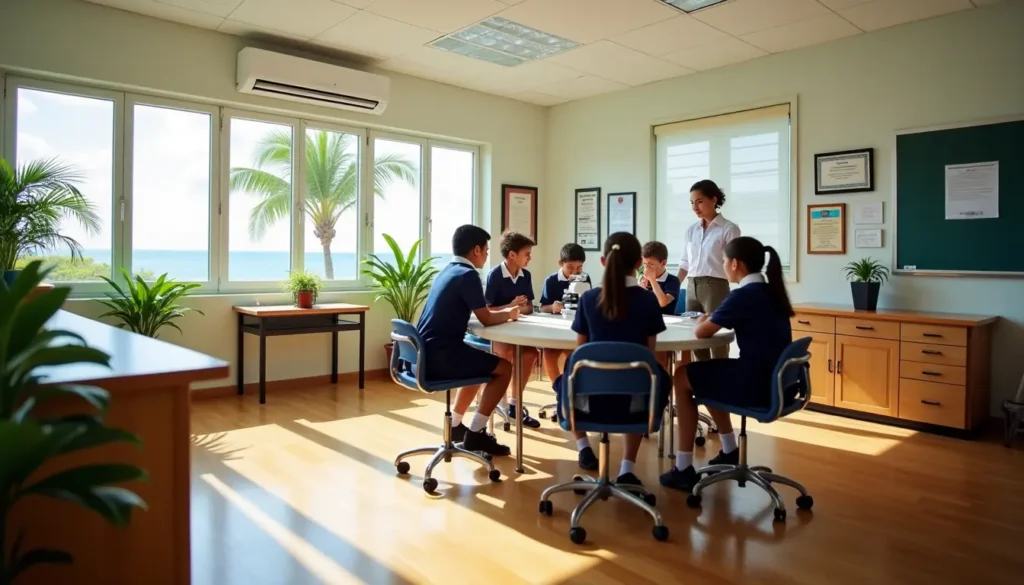
Private schools throughout the islands embrace different educational approaches. To name just one example, the VI Montessori School and International Academy educates more than 200 students from toddler years through high school. Gifft Hill School on St. John takes pride in its intimate atmosphere with graduating classes between 10 and 30 students. These schools also provide AP courses, arts programs, and sports activities.
Let us walk you through everything you need to know about private education in the USVI. From admission details to daily student experiences, we’ll help you choose between options like St. Croix Montessori and Antilles School’s five-point educational program for 2025 and beyond.
Current State of Private Schools in USVI
Private education in the US Virgin Islands looks quite different today than it did a few years ago. The territory’s schools spread across three main islands, each with its own unique private education choices.
Number of schools by island
The USVI has 27 private and parochial schools in its districts. The St. Thomas and St. John District has 14 private schools, while St. Croix District has 13. St. Thomas’s well-known schools include Antilles School, VI Montessori School and International Academy, along with religious institutions like All Saints Cathedral School.
St. Croix’s private schools include Good Hope Country Day School, AZ Academy, and Caribbean Community School. These schools teach students from pre-kindergarten through high school, and some focus on specific age groups or teaching methods.
Total student enrollment
Student numbers in private schools have changed dramatically. The years between 2013-14 and 2019-20 saw a 17.4% drop in private school enrollment, going from 4,681 to 3,865 students.
St. Thomas/St. John District’s enrollment numbers stayed higher than St. Croix’s. By 2019-20, St. Thomas/St. John had 2,306 students, while St. Croix taught 1,559 students.
Recent numbers tell an interesting story. St. Croix District’s private schools grew by 8% from 2017-18 to 2019-20. St. Thomas/St. John saw similar growth at 7% during this time. But both areas faced challenges later on. St. Croix’s numbers fell to 1,108 students while St. Thomas/St. John dropped to 1,754.
Families moving to the Virgin Islands tend to pick private or religious schools for their children. This choice remains popular despite varying tuition costs and other educational options in the area.
Understanding Different Types of Private Schools
Private education in the USVI provides different learning approaches that align with educational philosophies and family priorities.
Religious schools
Saints Peter & Paul Catholic School is one of the territory’s oldest educational institutions, dating back to 1924. The school started as an elementary institution and grew to include high school education in 1946. Students celebrated their first graduation in 1950. The school focuses on intellectual, moral, and social development.
All Saints Cathedral School welcomes students of every race, color, and national origin. Religious schools throughout the territory combine spiritual teachings with strong academic programs. Most offer education from pre-kindergarten through grade 12.
International schools
The Virgin Islands Montessori School and Peter Gruber International Academy (VIMSIA) stands out among global educational institutions. VIMSIA is one of just 238 schools worldwide that offers both the Middle Years Program (MYP) and Diploma Program (DP) through the International Baccalaureate Organization. Students at VIMSIA develop:
- Critical thinking and complex problem-solving skills
- Self-driven learning opportunities
- Pathways to top-ranking universities worldwide
- Cultural awareness through second language development
- Global engagement preparation
International schools serve expatriate families, especially when you have multinational corporation executives and diplomatic staff. These schools maintain globally recognized accreditation standards to ensure smooth transitions for students moving between international locations.
Montessori programs
Montessori education has a strong presence throughout the islands. The Virgin Islands Montessori School opened its doors in July 1964 and now offers programs from toddler through grade twelve. The school creates a unique educational environment by blending Montessori methodology with international curriculum standards.
St. Croix’s Montessori options include St. Croix Montessori for ages 3-9 and Rattan Montessori. These programs put children at the center of their educational approach and emphasize individualized learning.
The territory’s Montessori schools hold accreditation from respected organizations like the Association Montessori Internationale (AMI). This ensures they follow authentic Montessori principles. Students benefit from a proven alternative to conventional schooling that combines traditional Montessori methods with modern educational standards.
Complete Cost Breakdown for Parents
Families need to know what private education costs to make smart choices about their children’s schooling in the US Virgin Islands.
Tuition ranges
Private school costs in the USVI change by a lot based on grade level and school type. Antilles School, a leading institution in St. Thomas, charges from USD 14,300 for toddler programs to USD 27,400 for grade 12 students. St. Croix Country Day School has lower rates that range from USD 7,350 to USD 11,000.
Gifft Hill School sets its fees based on grade levels. The early learning center costs USD 13,600 while high school education runs USD 19,000. Schools often give sibling discounts. We noticed most schools offer USD 250 off each year for each additional child.
Additional fees
Parents should plan for extra costs beyond the basic tuition. Antilles School requires a non-refundable enrollment deposit of USD 500, which they later subtract from the total tuition cost. New students’ families need to pay into the Parent Revolving Endowment Fund (PREF). This means USD 500 for families getting financial aid and USD 1,000 for others.
Technology fees, uniforms, and school materials add to the total cost. Some grades have set supply fees, like USD 25 for grades 3-5. Uniform shirts start at USD 20, and you can buy patches separately for USD 5.
Financial aid options
USVI private schools have strong financial aid programs. Antilles School uses over 18% of its yearly budget for financial aid [link_2]. This is a big deal as it means that they give more than other similar independent schools nationwide. The school helps about 40% of its students with financial support.
Financial aid comes in several forms:
- Need-based grants and scholarships
- Merit-based awards for academic excellence
- Payment plan options (monthly, quarterly, or semi-annual)
- Sibling discounts and multi-child enrollment benefits
The Virgin Islands Board of Education helps families through various programs. Special legislative grants range from USD 600 to USD 7,000 each year. Schools use professional services like FACTS or TADS to review financial aid applications. This ensures fair and private handling of all requests.
Schools offer different payment schedules. Extended payment plans might include finance charges of 12% yearly. Late payments usually cost USD 75 extra each month plus interest.
Academic Standards and Curriculum
USVI private schools excel academically by blending internationally recognized curricula with high standards. These schools now give students various educational paths to prepare them for opportunities worldwide.
US vs International curricula
Good Hope Country Day School changed its educational approach by bringing in Cambridge International, a prestigious curriculum used in 10,000 schools across 160 countries. This program stands out as the world’s only K-12 curriculum that a university created and continues to manage.
Students from Early Learning Center through 12th grade study core subjects like Computer Science, English General Paper, Global Perspectives, Marine Science, Spanish, and U.S. History. Students who do well in Cambridge examinations can earn college credits that more than 800 U.S. universities accept.
Other schools use National Core Standards for Mathematics and English Language Arts along with Next Generation Science Standards. This mix helps students meet mainland U.S. requirements while staying competitive internationally.
Advanced placement offerings
Antilles School shines with its strong Advanced Placement program. Their AP curriculum includes:
- Core Sciences: Biology, Environmental Science, Physics 1
- Mathematics: Calculus AB & BC
- Humanities: English Literature and Composition, European History, U.S. History
- Economics: Macro & Micro
- Language: Spanish Language and Culture
Students can earn college credits through these advanced courses and reduce their future tuition costs. The curriculum builds critical thinking, research skills, and supports complete academic growth.
The Virgin Islands Department of Education’s regulations help schools keep high academic standards. Private schools must show their educational courses meet their stated goals. Teachers must have specific competency credentials to provide professional, exemplary instruction.
Schools keep detailed progress records and use well-laid-out grading systems. The academic structure helps develop confident, involved, and thoughtful learners who can analyze, assess, and combine information effectively. This all-encompassing approach prepares students for college success and lifelong learning challenges.
Admission Process Explained
Parents looking to enroll their children in private schools throughout the US Virgin Islands should pay close attention to deadlines and documentation requirements. The application process differs between institutions and needs a structured approach.
Application deadlines
Private schools in USVI operate on a specific application schedule. The main enrollment period runs from January through April for both public and private institutions. A secondary application window opens in November for private schools. This gives families who relocate mid-year more options.
Private institutions suggest starting the application process six months before the planned enrollment date. Families eyeing the 2025-2026 academic year should begin their preparations by summer 2024. This timeline ensures a hassle-free admission process.
Required documents
The admission process needs specific documentation from applicants. Parents must submit these items along with the standard application form:
- Valid birth certificate
- Complete immunization records with clinic certification
- Passport-size photographs of both child and parent/guardian
- Child’s passport (when applicable)
- Official student transcript with school seal
- Health insurance documentation
Students applying to private schools need one more document – a letter from their chosen school confirming space availability. The Ministry of Education won’t process applications without this confirmation letter.
International students or those with foreign language documents must get certified translations. The previous school’s principal should send the official transcript directly to:
The Chief Education Officer Ministry of Education & Culture Government of the Virgin Islands P.O. Box 72 Road Town, Tortola VG 1110
Schools accept report cards from the previous two terms if transcripts aren’t available. Non-parent guardians should provide additional paperwork – a notarized letter from parents or legal custody documents.
Private institutions often have their own extra requirements. Teacher recommendations from current math and English instructors are a vital part of admission decisions. These recommendations should showcase the student’s academic progress, enthusiasm for learning, and behavior in class.
Student Life and Activities
Private schools in the US Virgin Islands are dedicated to developing well-rounded students through their diverse after-school programs. These institutions go beyond academics to create meaningful experiences through various activities.
Sports programs
Students compete in sports throughout the year through the St. John/St. Thomas District Interscholastic Athletic Association. The sports programs welcome students at every skill level and encourage participation.
The schools offer several sports options:
- Volleyball (boys and girls)
- Basketball (boys and girls)
- Soccer (boys and girls)
- Cross country
- Track and field
- Sailing
Gifft Hill School features Trayser Field, one of just two turf fields in the Territory. The field serves both students and the St. John community, showing the school’s dedication to everyone’s well-being. Each sports season costs USD 100, but scholarships help students who need financial support.
Arts and music
The schools’ strong fine arts programs cover theater, band, and visual arts. Antilles School starts music education early in Lower School, where students learn about different cultures through songs and performances.
Students can perform at various events through the band program:
- Fine Arts Festival
- Courtyard mini-concertettes
- Spring Concert
Band members can join Tri-M, an International Honor Society that connects over 6,200 chapters worldwide. The visual arts program builds skills step by step, starting with simple concepts in early learning centers and moving to student-chosen projects in upper grades.
After-school activities
Students can choose from many after-school activities. Antilles School’s Spring 2025 schedule offers:
- Soccer (Grades K-3)
- Piano Classes (PK4-12)
- Drama Fun (Grades 1-5)
- Chess (Grades 1-12)
- Crafty Kids (Grades 1-3)
- Creative Story Play (PreK4 & Kindergarten)
The St. John School of the Arts supports school programs by reaching more than 300 underserved students. Students learn both Caribbean culture and classical arts, getting real experience in Virgin Islands arts, dance, music, and folklore.
Operation Inspire, which the USVI Economic Authority recognizes, helps public school students with homework and enrichment programs. Students develop modern skills through hands-on projects.
Music education thrives at G-Clef Music Academy, where students can learn piano, drums, guitar, violin, steel pan, and voice year-round. These programs help students grow musically while keeping up with their studies.
Transportation and Logistics
Students traveling to private schools in the US Virgin Islands need good planning and knowledge of their transportation choices. The territory gives students several ways to reach their schools safely and quickly.
School bus services
The Virgin Islands Department of Education provides bus services to both public and private school students. Parents should submit their bus service applications by August 7 to get transportation for their children.
School Bus, Inc. works with the VI Department of Education to transport students throughout St. Thomas. The service runs on regular education and summer schedules that connect schools with pickup points across the island.
These safety rules must be followed:
- Students must be 5 years or older to ride alone
- Kids under 5 can only ride with older siblings
- Each seat fits two students only
- Students need masks during health alerts
- Parents must make sure their children get off at the right stops
Students won’t have bus service when VI public schools close or during half days with 11:30 am dismissal. Families need backup transportation plans for these days. Parents can ask School Bus, Inc. about specific routes by calling 340-779-2021.
Carpool options
Private schools across the islands offer carpooling choices besides regular bus services. Several new transportation networks now help the school community with alternatives to standard school busses.
CarpooltoSchool helps create safe and shared carpooling for students. School staff can use this platform to help parents create quick carpooling networks throughout the islands.
Some areas now use ride-sharing services to fill transportation gaps. These services help a lot in places where school busses don’t run often. The Virgin Islands Transit System (VITRAN) gives students discount cards that include:
- 25% off city and country routes
- Year-round cards for full-time students
- USD 5.00 yearly card fee
- Access to all public transportation
The Department of Public Works promotes public transit as a good choice to connect riders with different types of land and water transit. Their mission includes:
- Advanced transportation technology
- Safe connections to schools
- Budget-friendly transit choices
- Better accessibility
Some schools give transportation stipends to help parents with costs. Some districts offer monthly stipends up to USD 500.00 for students who qualify. Parents should ask about transportation help during admission.
Many schools partner with special student transportation services. These providers must meet strict requirements:
- Driver background checks
- Vehicle safety tests
- Immediate location tracking
- Full insurance coverage
The territory’s Department of Public Works oversees all public transportation to ensure safety and smooth operation. Their Transportation Division keeps improving transit options to support regular school attendance and after-school activities.
Parent Involvement Opportunities
Parent engagement in US Virgin Islands private schools goes way beyond the usual parent-teacher meetings. The territory has managed to keep a legal policy since 1996 that encourages parents to get involved in school activities. This dedication shows in the many ways families can participate across the islands.
PTA programs
Parent-Teacher Associations in private schools of all sizes show different levels of participation. We noticed that schools with parent-teacher association rates above 90% have amazing academic results, and their student graduation rates reach 98%.
The Virgin Islands Montessori School and International Academy (VIMSIA) runs an active PTA portal that makes shared engagement possible through several channels:
- Online tuition payment systems
- Access to school policies and forms
- Student support resources
- Yearbook participation opportunities
PTAs organize fundraising events throughout the academic year to support school development projects. These associations are a vital link between families and school administration that helps create open communication and shared decision-making.
Volunteer activities
Parents who want to be more involved in their children’s education have many options to volunteer. St. John’s educational institutions welcome parent volunteers who can help with:
- Classroom organization and maintenance
- Administrative support
- Teaching assistance
- Concert series coordination
Parents can also take part in environmental initiatives. The Friends of Virgin Islands National Park runs regular activities:
- Habitat restoration projects
- Sea turtle protection programs
- Community events organization
- Marine debris cleanup campaigns
School events
School calendars feature many events where parents can participate. Good Hope Country Day School believes students succeed best when schools and families work together.
Virgin Islands law supports this partnership. Employers must give their workers two hours of paid leave each month to visit schools. This policy covers:
- Government employees
- Private sector workers in companies receiving EDC benefits
- Employees under Act 4740 benefits
Workers need to tell their employers ahead of time and show proof they attended the school activity. Schools organize various events all year long:
Regular Activities:
- Parent-teacher conferences
- Academic showcases
- Sports competitions
- Arts performances
Special Programs:
- Cultural celebrations
- Science fairs
- Career day presentations
- Holiday performances
Saints Peter and Paul Catholic School holds regular events to recognize academic excellence, leadership, and community involvement. These activities help parents take part in their children’s educational experience while creating stronger school communities.
Schools in the territory value what makes each person unique in their diverse, multicultural communities. Purpose 4 Life, Inc. in St. Thomas creates youth outreach programs that focus on getting parents involved in student development.
WIN WINS, a non-profit organization, helps parents support their children’s athletic development. The Reichhold Center for the Performing Arts, with its 1,200-seat outdoor amphitheater, hosts events where parents can volunteer and join cultural programs regularly.
Schools enable parents with culturally appropriate tools and support. This approach helps create better learning environments at home and deepens the educational community’s commitment across the US Virgin Islands.
Conclusion
Private schools in the US Virgin Islands give families something beyond just great academics. These institutions create an environment where students can truly flourish through detailed programs – everything from Cambridge International curricula to a rich variety of after-school activities.
Parents who want to explore private schools in St. Thomas, St. John, or St. Croix will discover options that match their educational goals. Each school brings its own strengths to the table. Antilles School shines with its proven AP programs, while Good Hope Country Day School maintains international standards. VI Montessori’s unique teaching approach sets it apart.
Choosing the right school needs careful thought about several key points. The cost of tuition matters, of course, but many schools offer substantial financial aid packages. School busses and carpooling networks help families sort out their daily schedules. When parents get involved in these educational communities, it creates lasting positive effects on their children’s success.
These schools equip students to tackle future challenges while keeping Caribbean cultural values alive. Families who live in or plan to move to the USVI can rest assured – their children will get an education that matches mainland U.S. standards while enjoying island life’s unique advantages.
FAQs
Q1. What types of private schools are available in the US Virgin Islands? The US Virgin Islands offer various types of private schools, including religious schools, international schools, and Montessori programs. These schools cater to different educational philosophies and family preferences, providing diverse learning approaches across the islands.
Q2. How much does private education cost in the US Virgin Islands? Private school tuition in the USVI varies widely, ranging from around $7,000 to $27,000 per year, depending on the institution and grade level. Additional fees may include enrollment deposits, technology fees, and uniforms. Many schools offer financial aid options to help families manage costs.
Q3. What curriculum do private schools in the USVI follow? Private schools in the USVI offer a mix of US and international curricula. Some schools follow the National Core Standards, while others implement programs like Cambridge International. Many institutions also offer Advanced Placement (AP) courses, preparing students for both US and global educational standards.
Q4. How can parents get involved in their child’s private school education in the USVI? Parents can participate in various ways, including joining Parent-Teacher Associations (PTAs), volunteering for school activities, and attending school events. Many schools encourage parent involvement through regular academic showcases, sports competitions, and cultural celebrations.
Q5. What transportation options are available for private school students in the USVI? Transportation options include school bus services provided by the Virgin Islands Department of Education, carpooling networks, and public transit systems. Some schools offer transportation stipends, and there are specialized student transportation services available with safety measures in place.
